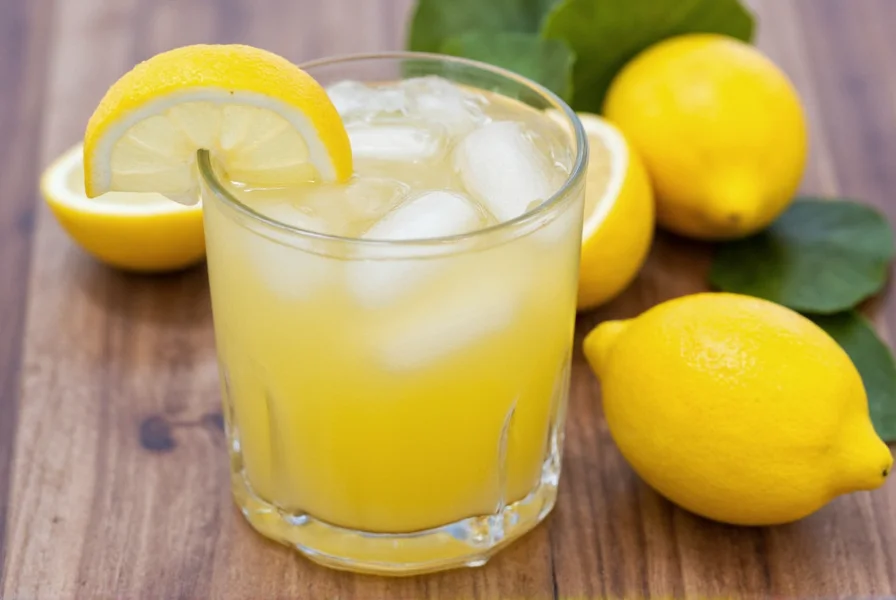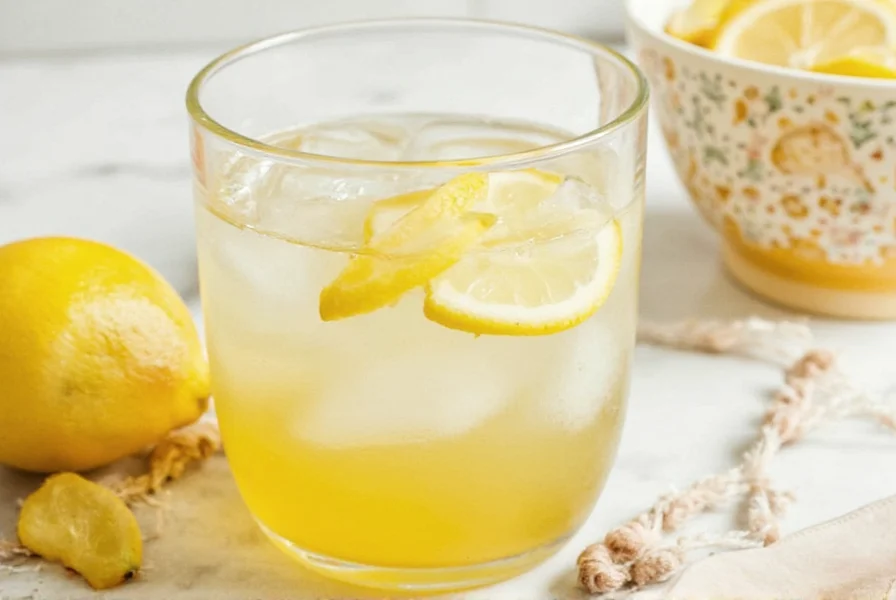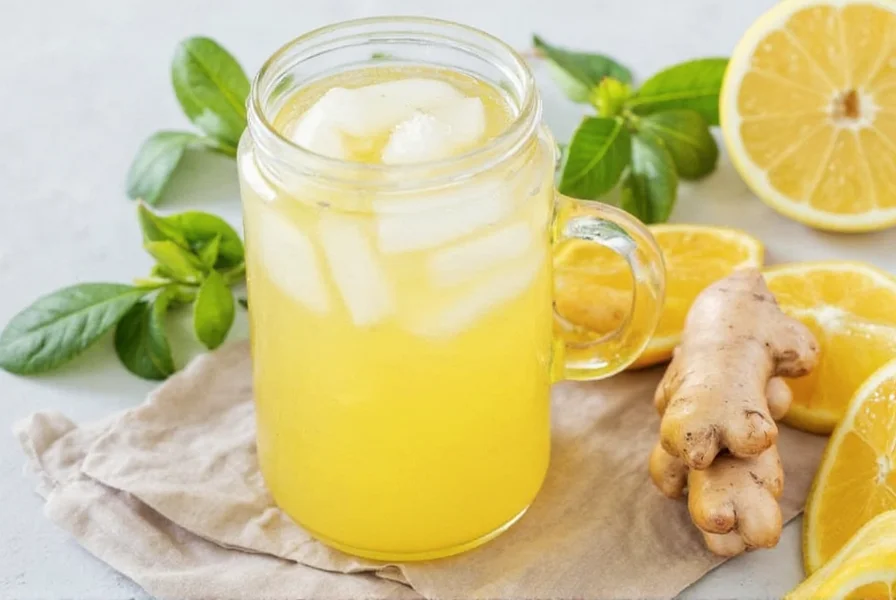For centuries, cultures worldwide have embraced ginger lemon drinks as a natural remedy and refreshing beverage. This simple combination harnesses the powerful properties of two kitchen staples to create a drink that's both delicious and beneficial for your wellbeing. Unlike commercial beverages loaded with sugar and preservatives, a homemade ginger lemon drink delivers pure, natural goodness with minimal preparation.
The Science-Backed Health Benefits of Ginger Lemon Drink
Ginger and lemon each bring unique nutritional profiles that complement each other perfectly. Ginger contains gingerol, a bioactive compound with potent anti-inflammatory and antioxidant properties. Research published in the Journal of Medicinal Food confirms ginger's effectiveness in supporting digestive health and reducing nausea. Lemon contributes vitamin C, flavonoids, and citric acid, which enhance iron absorption and support immune function.
When combined in a ginger lemon drink for weight loss support, these ingredients create a synergistic effect. The thermogenic properties of ginger may help boost metabolism, while lemon's pectin fiber can promote feelings of fullness. However, it's important to note that while this beverage supports healthy habits, it's not a magic solution for weight management—consistent healthy eating and exercise remain essential.
Simple Ginger Lemon Drink Recipe for Daily Wellness
Creating the perfect ginger lemon drink requires just three basic ingredients and minimal preparation time. This basic ginger lemon tea recipe serves as an excellent foundation that you can customize to your taste preferences.
| Ingredient | Amount | Preparation Notes |
|---|---|---|
| Fresh ginger root | 1-2 inch piece | Peel and slice thinly or grate for stronger flavor |
| Fresh lemon | Half lemon | Organic preferred for unpeeled use |
| Water | 8-12 ounces | Hot for tea, cold for refreshing drink |
| Honey (optional) | 1 teaspoon | Raw honey adds additional benefits |
Preparation method: For hot ginger lemon drink, bring water to a gentle boil, add sliced or grated ginger, and steep for 5-10 minutes. Remove from heat, add fresh lemon juice, and optional sweetener. For cold ginger lemon water, muddle ginger in a small amount of room temperature water, then add ice and cold water with lemon juice.

Popular Variations of Ginger Lemon Drink
While the basic recipe satisfies most preferences, numerous variations can enhance flavor and benefits. A turmeric ginger lemon drink incorporates anti-inflammatory turmeric for additional health support. For those seeking ginger lemon drink for cold relief, adding a pinch of cayenne pepper can help clear sinuses. The honey ginger lemon drink version provides natural sweetness while preserving the drink's soothing properties.
For an iced ginger lemon drink perfect for warm weather, prepare a concentrated ginger infusion, then chill and mix with fresh lemon juice and cold water. Some prefer ginger lemon cucumber drink for added hydration, while others enjoy ginger lemon mint drink for digestive support. Each variation maintains the core benefits while introducing complementary flavors and properties.
Optimal Timing and Consumption Guidelines
When to drink ginger lemon water matters for maximizing benefits. Many health practitioners recommend consuming ginger lemon drink in the morning on an empty stomach to stimulate digestion and metabolism. This practice supports the body's natural detoxification processes after overnight rest.
For digestive support, enjoy a small serving 20-30 minutes before meals. Those using ginger lemon drink for nausea relief may benefit from sipping small amounts throughout the day. The ideal frequency is 1-2 servings daily, though individual tolerance varies. Remember that more isn't necessarily better—excessive consumption may cause heartburn or stomach upset in sensitive individuals.
Important Considerations and Precautions
While generally safe for most people, certain considerations apply when preparing ginger lemon drink at home. The acidity of lemon may erode tooth enamel over time, so drinking through a straw and rinsing your mouth afterward is advisable. Those with gastroesophageal reflux disease (GERD) should monitor their tolerance, as ginger can sometimes exacerbate symptoms.
Individuals taking blood thinners should consult their healthcare provider before consuming large amounts of ginger, as it may interact with medication. Pregnant women can typically enjoy moderate amounts of ginger lemon drink, but should discuss with their obstetrician, especially during the first trimester. Always use fresh, high-quality ingredients for the best ginger lemon drink benefits without side effects.

Frequently Asked Questions
How long does homemade ginger lemon drink last in the refrigerator?
Freshly prepared ginger lemon drink maintains optimal flavor and benefits for 2-3 days when stored in an airtight container in the refrigerator. The ginger infusion may separate, so give it a gentle shake before serving. For best results, prepare small batches daily to enjoy maximum freshness and potency.
Can I use bottled lemon juice instead of fresh for ginger lemon drink?
While fresh lemon juice provides superior flavor and higher vitamin C content, bottled lemon juice can work in a pinch. However, many bottled varieties contain preservatives and have reduced nutritional value compared to freshly squeezed lemons. For the authentic ginger lemon drink experience with maximum health benefits, fresh citrus is always recommended.
Does ginger lemon drink help with weight loss?
Ginger lemon drink supports weight management efforts by promoting hydration, potentially boosting metabolism slightly, and serving as a low-calorie alternative to sugary beverages. However, it's not a standalone weight loss solution. When incorporated into a balanced diet and active lifestyle, this beverage can complement healthy habits but won't produce significant weight loss on its own.
What's the difference between ginger lemon tea and regular ginger lemon drink?
Traditional ginger lemon tea typically involves steeping ginger in hot water like tea leaves, while ginger lemon drink can be served hot or cold without the steeping process. Ginger lemon tea often has a stronger ginger flavor due to longer infusion time, while the drink version may include additional ingredients like honey or mint. Both provide similar health benefits with slight variations in preparation and serving style.
Can children safely consume ginger lemon drink?
Children over 2 years old can generally enjoy diluted ginger lemon drink in moderation. Start with small amounts (2-4 ounces) and monitor for any adverse reactions. For young children, use less ginger and more water to create a milder version. Always consult with a pediatrician before introducing new beverages to children with medical conditions or digestive sensitivities.











 浙公网安备
33010002000092号
浙公网安备
33010002000092号 浙B2-20120091-4
浙B2-20120091-4